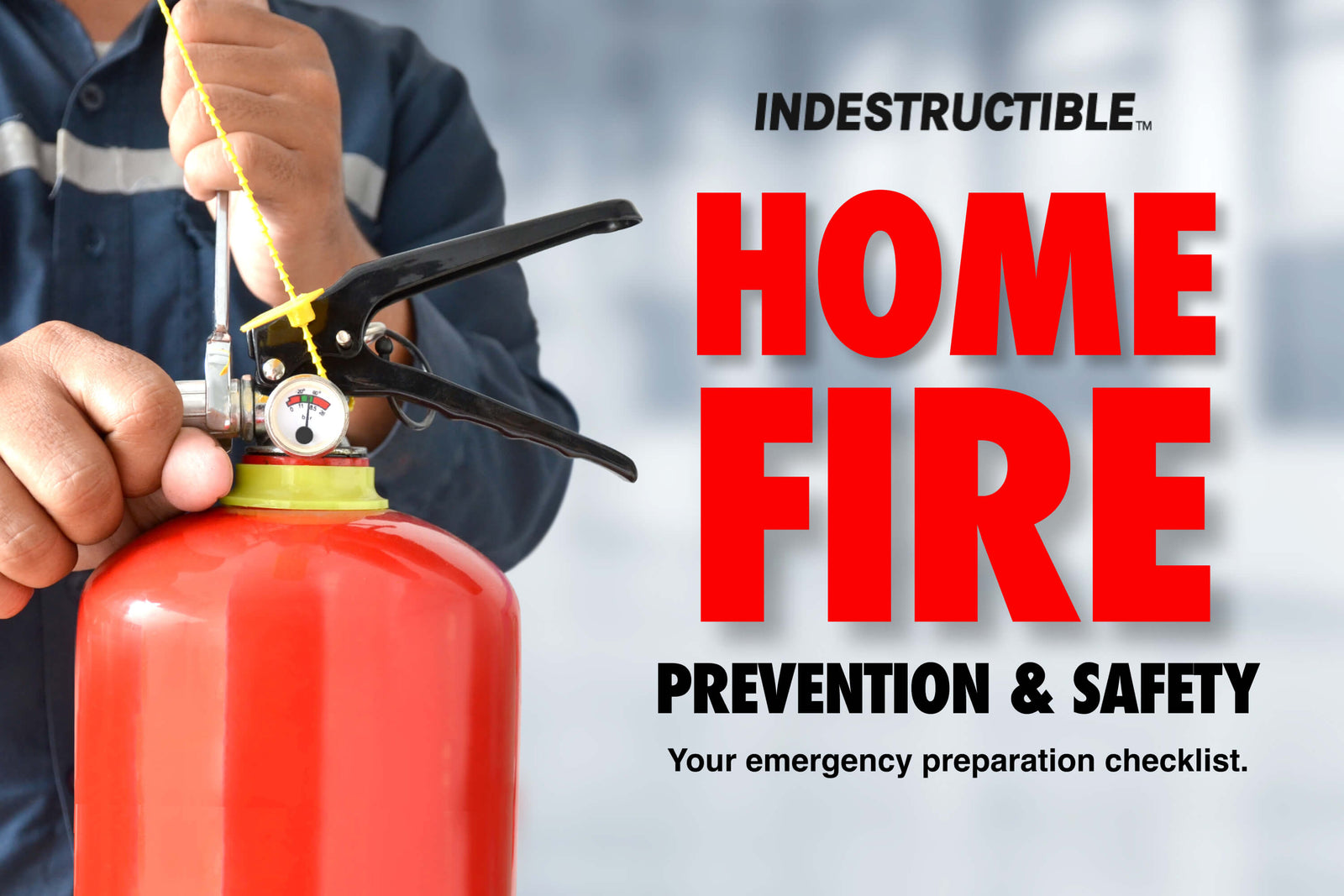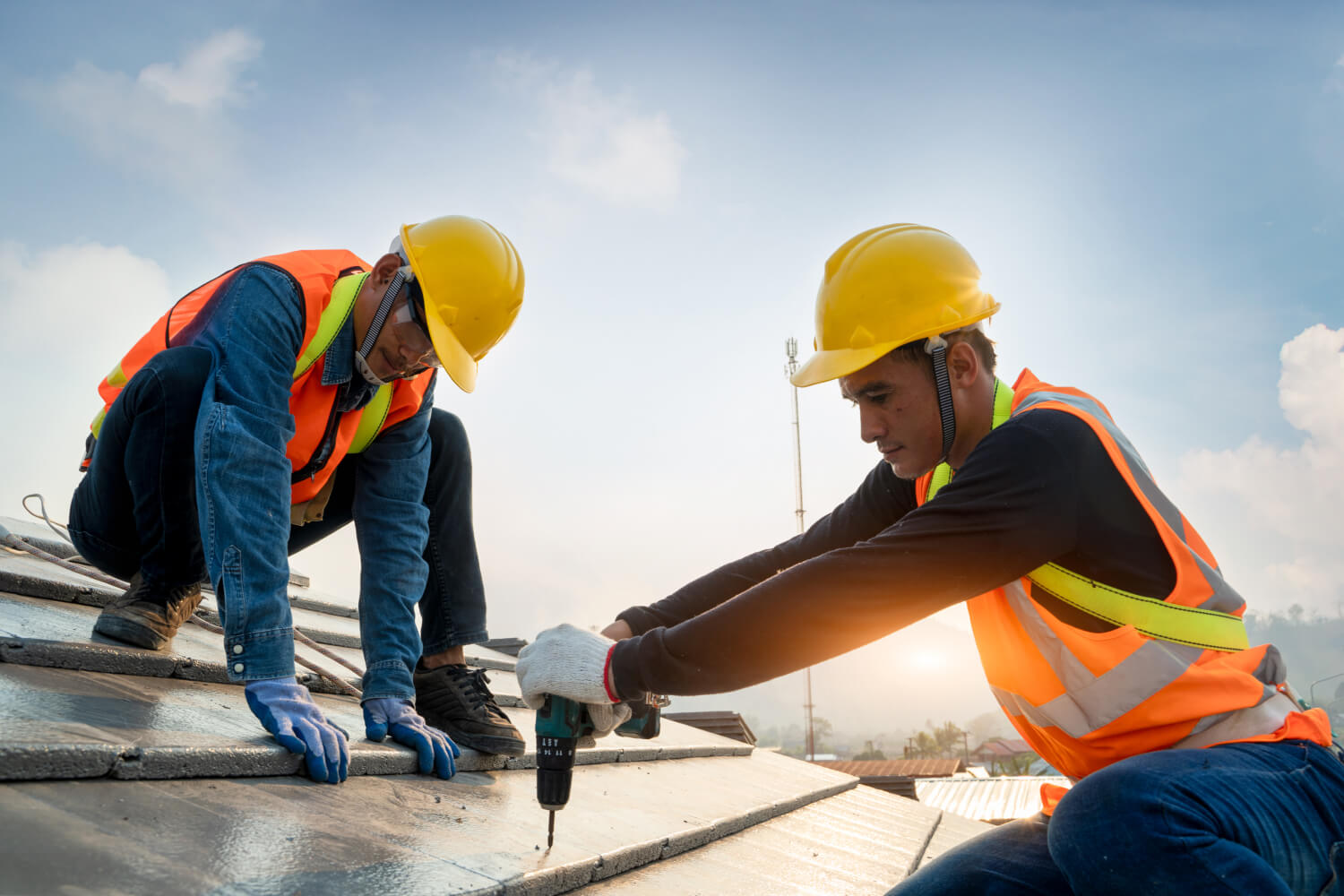Expect the unexpected. Take nothing for granted and make every effort to keep your home and loved ones safe from house fires with this preparation guide.
Take steps to prevent a house fire.
Many home fires are preventable, and here are some common ways you can help keep your home safe.
Watch your cooking. Never leave the stove unattended while you are cooking. Stay close at hand, even when you're simmering that pot of tomato sauce for five hours. Never walk away from frying, grilling, or broiling food.
Maintain space around space heaters. Make sure to leave at least three feet of open space around any fixed or portable space heaters in your home. Turn them off when you leave or go to sleep.
Don't smoke inside. Take that cigarette outside and ask your guests to do the same. Make sure all ashtrays are deep and sturdy.
Lock up lighters. Keep matches and lighters up high out of reach of children inside a locked cabinet.
Maintain electrical cords. Replace all cords that are cracked, damaged, with broken plugs, or with loose connections.
Practice candle safety. Blow out any candles when you leave the room or go to sleep. Make sure they're 1 foot away from anything that can burn while they are lit.
Inspect the electricity.Hire an electrician to inspect your wiring for susceptibility to fire.
Use surge protectors. If you need to plug multiple items into one plug, use a surge protector. If you use multiple devices in your home, hire an electrician to install additional sockets to spread out the electrical burden.
Keep outlets clear. Don't store flammable items like bedding, towels, and rugs near electrical outlets. Store flammable liquids at a safe distance away from any outlets.
Don't overload your kitchen outlets. Unplug units when they're not in use, and if any appliance emits sparks or begins smoking, unplug it, and call an electrician immediately.
Don't ignore signs of electrical stress. Flickering lights or a strange buzzing from an outlet can indicate an electrical problem. Unplug everything from the outlet and have it checked by a professional electrician.
Install pest and rodent screens. Discourage animals from building nests along solar panels. If you install solar panels or buy a home with solar panels, have them inspected to ensure they meet the fire-specific provisions within the National Electric Code (NEC) and other fire safety precautions found in the International Resident Code (IRC)

Are you renovating your home?
Practice good housekeeping to lay the foundation for fire prevention while you work.
Maintain a safe job site by.
- Make sure your work area is well-lit and free of loose debris.
- Have plenty of containers and dumpsters to dispose of debris often.
- Make sure all exits, walkways, and stairways are clear.
- Keep fire extinguishers and first aid supplies readily accessible.
- Keep an eye out for protruding nails from lumber and pull them or hammer them down.
- Keep all gasoline cans and other flammables stored outside in appropriate safety cans.
Prevent accidents that can trigger house fires by protecting yourself from foot hazards in the work area. Falling objects, slippery surfaces, protruding objects, and electrical hazards are just a few of the things that can cause an accident.
Don’t risk this leading to another accident, such as a fire, by wearing protective foot gear.
⭐⭐⭐⭐⭐
J3 Black
The fit was comfortable, and the reinforced toe gives you the confidence to tackle any project. The lightweight materials allow for easy mobility and less fatigue. The breathable fabric lets you get wet and dry the shoes quickly without having to hang them.
Johnny B.

Plan ahead to keep your loved ones safe!
When a smoke alarm goes off in your house, you may have as little as two minutes to escape. Make sure everyone in your family knows what to do and where to go if there's a fire.
Use smoke alarms properly to save lives.
If every home had at least one working smoke alarm, around 890 lives would be saved each year in this country. ~NAHB Working smoke alarms make a life-saving difference.
Ideally, you should install a smoke alarm inside every sleeping room and outside every sleeping area. Each level of the house should have alarms installed. Set them to be interconnected so that if one is set off, they all sound.
Don't install a smoke alarm within ten feet of the stove to reduce false alarms.
A working smoke alarm provides your family with the earliest fire detection possible, giving you time to escape quickly. You also stand the best chance of saving your property with this early detection by allowing the fire department to get there in time.
Test each smoke alarm once a month and replace the batteries as needed. Replace them when they reach 10 years of age.
Install up-to-date smoke alarms.Today's technical advances have created smoke alarms that can respond to multiple fire conditions yet still mitigate false alarms. You can also get special alarms that use strobe lights and shake the bed for disabled individuals.
Smoke alarms and Carbon Monoxide (CO) alarms use different signals. Check your brand and model online if you don't have a manual to learn the difference.
Smoke alarm sounds.
- Beep, beep, beep - three loud beeps mean GET OUT, CALL 9-1-1, and STAY OUT.
- Chirp - every 30-60 seconds indicates the battery needs replacing.
- Excessive chirping after the battery is replaced means the alarm has reached the end of its life and needs replacing.
Carbon Monoxide (CO) alarm sounds.
- Beep, beep, beep, beep - four loud beeps means dangerous carbon monoxide is present. Go outside, call 9-1-1 and stay out.
- Chirp - every 30-60 seconds indicates the battery needs replacing.
- CO alarms also have a unique end-of-life sound that varies by manufacturer. Check your manual for this sound.

Putting your home escape plan in place.
Only one of every three American households has developed and practiced a home escape plan, according to a NEPA survey.
Why you need an escape plan and why you should practice it together.
Have your escape plan in place and practice it twice a year to ensure everyone's safety. Practicing the emergency routine will help everyone stay motivated to get to safety in the best manner possible without confusion turning into panic.
No emergency happens when you expect it to happen. It's likely a house fire would happen while you slept or otherwise least expect it, and you're not mentally ready for it. Practicing helps your family automatically take the safest route out.
Train your mind now and teach your children that when the smoke alarm goes off, think about getting out FIRST. Assess the situation to see if there's a simple, non-emergency solution after you're safe, not before.
Tips for making your home escape plan.
- Draw a map of your home that shows all the doors and windows. Use this map while you discuss your escape plan with everyone.
- Have at least two ways out of every room, if possible. Make sure the doors and windows are easy to get through.
- Designate an outside meeting place a safe distance from the house everyone knows to run to after escaping.
- Practice a home fire drill twice a year.
- Practice using different ways to get out of the house.
- Make sure your children understand how to escape on their own if you can't get to them.
- Stay out and never go back in.
Need to add windows or install better ones?Consider installing egress windows in difficult areas that open fully to allow people to escape through them. Check your local requirements if you're renovating, as the codes for egress windows vary from place to place.
Here are some types of egress windows and tips.
- Emergency escape windows on the roof need to have at least a 36-in-wide path from the window to the eave.
- Basement egress windows must include window wells that provide enough clearance to escape.
- Casement egress windows swing in or out to open like a door, allowing for more size variation and making them the most popular.
- Single-hung and double-hung egress windows are popular in older homes and colder climates.
- Sliding egress windows need to be at least 4X4 feet.
- Awning egress windows are not suitable for basements.
Follow these three rules to escape your home in the event of a house fire.
- GET OUT AND STAY OUT when the smoke alarm sounds.
- If you're escaping through smoke, GET LOW AND GO under the smoke to the outside.
- CALL the fire department from outside your home.

What do you do after a house fire?
Your house caught fire, your family is out of the house, and you've called 9-1-1. Now, what happens?
First, give first aid as needed. Cool and cover any burns as best as possible while waiting for help.
Once everyone is taken care of or under care, let your friends and family know you're safe. News travels fast, but not with all the details and reassurances they need.
Stay out of the fire-damaged home until the authorities say it's safe.
Don't ignore the emotional wounds.
- Watch your loved ones and make sure they're handling the stress.
- Watch your pets closely and keep them under your direct control.
- Remain calm and pace yourself.
Whether there is significant damage to your home or a little, the traumatic experience is upsetting for everyone involved. Children may become afraid, and older adults may seem disoriented. It's important to reassure them that they are safe and that you will find them a safe place.
Your child may become afraid it will happen again, and the possibilities of what could have happened are difficult for many children to deal with. Stay calm, take it slow and follow these tips to help them recover more quickly.
- Try to return to as many of your personal and family routines as quickly as possible.
- Get plenty of rest and drink plenty of water.
- Limit their exposure to the sights and sounds of disaster, especially on the television and internet.
- Focus on the positive.
- Recognize your own feelings, and don't expect too much of yourself.
- Reach out and accept help from others.
- Do enjoyable things together that you all love.
- Stay connected to others.
- Don't expect immediate healing. It will take time.
Help your pets.
- Scared animals may react by biting or scratching. Be careful and calm with them.
- Try to leave them with the vet or a family member while you clean up the house.
- Make sure they're kept on their regular diet and drink plenty of water.
- Visit them regularly and play with them for both their mental health and yours.
At this point, now that you’ve taken care of your family, you can assess your home’s damage and determine your next steps. This will depend on the amount of damage. We won’t go into that here. Reach out to your support system, professionals, and insurance company for guidance.









